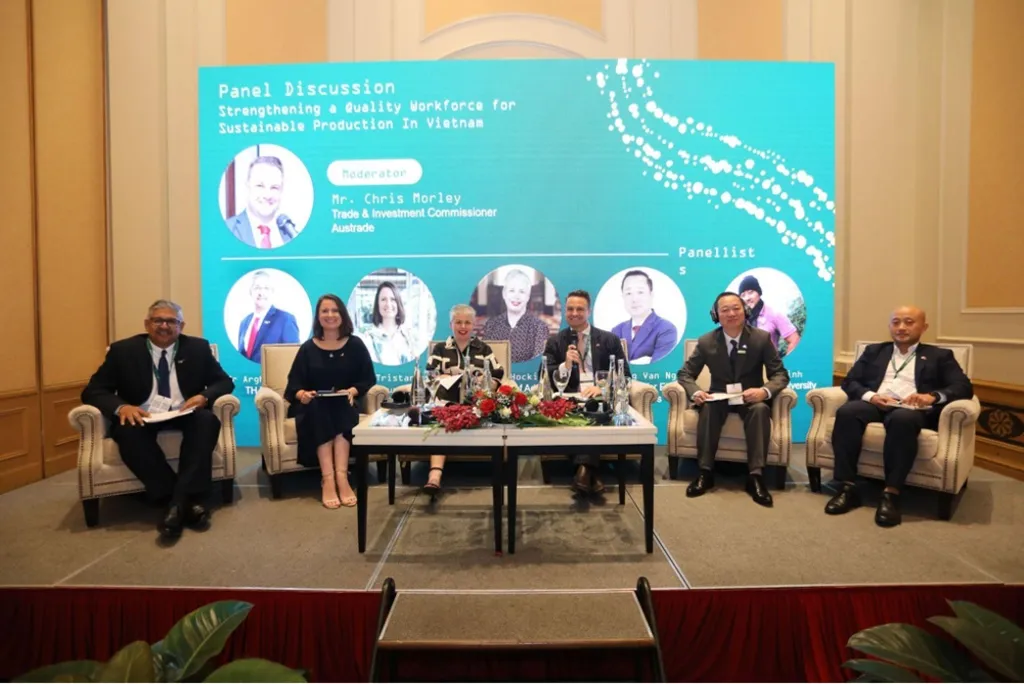 advertisement
advertisement

 |
| Professors and industry experts from Australia and Việt Nam discussed Preparing for Việt Nam’s Future Energy Workforce at an Austrade forum. — Photo courtesy of Austrade |
HCM CITY — Việt Nam and Australia are strengthening their partnership in sustainable manufacturing by prioritising technological advancements and workforce training.
Việt Nam has emerged as one of the fastest-growing economies globally, with an average annual GDP growth rate of 6 per cent from 2010 to 2023, fueled by sectors such as tourism, foreign investment, exports, and manufacturing.
However, economic growth has decelerated compared to the robust expansion observed in the 1990s and 2000s, which requires sustainable development strategies in the face of global economic uncertainties.
Manufacturing plays a crucial role in Việt Nam’s economy, but it also presents significant environmental challenges.
For instance, the cement industry has emitted between 62 and 70 million tonnes of CO2 over the past five years.
In addition, a 2022 study revealed that manufacturing constitutes nearly half of Việt Nam’s green job openings, yet the country faces a persistent shortage of skilled labour.
Pauline Tamesis, the United Nations Resident Coordinator in Vietnam, has cautioned that by 2030, around 60 per cent of young individuals may lack the requisite skills for participation in the green economy.
Global green transformation
Australia has made significant strides in sustainable manufacturing, driven by the government’s commitment to leading the global green transformation.
The ASEAN-Australia Special Summit in March underscored the economic corridor between Australia and Việt Nam as a key area for cooperation.
This reflects Australia’s ambition to enhance its presence in Southeast Asia and to solidify business relations with Việt Nam, particularly in sustainable manufacturing.
Major institutions such as the Center for Advanced Materials and Manufacturing at Edith Cowan University and the Materials and Manufacturing Futures Institute (MMFI) at the University of New South Wales are at the forefront of these initiatives.
These research centres are pioneers in their respective fields, advancing the frontiers of manufacturing through innovative endeavors in 3D metal printing, composite materials, nanotechnology, and artificial intelligence.
Through collaborative efforts, skills development, and knowledge transfer, Việt Nam can adopt advanced sustainable production techniques, mitigate its environmental impact, and promote greener industrial growth.
An Australian education delegation visited Việt Nam last month as part of the Southeast Asia Business Exchange Programme to explore new opportunities for cooperation in education, training, and research.
In 2023, Siemens Group partnered with the University of Technology Sydney to introduce a 40-hour course on Managing Modern Industrial Automation, funded by the New South Wales government.
This programme, designed to familiarise participants with advanced automation solutions, attracted numerous production managers from diverse sectors.
This collaboration exemplifies a growing trend in Australia, where educational institutions such as RMIT University and the Monash Sustainable Development Institute are developing courses to equip businesses with the skills necessary to address environmental, social, and governance (ESG) challenges.
Việt Nam is well-positioned to capitalise on its educational collaboration with Australia to establish a regional network dedicated to knowledge sharing and workforce training, thereby enhancing its manufacturing capabilities.
The partnership is expected to yield mutual benefits for both nations through the exchange of expertise in education and industry.
By integrating Việt Nam’s youthful workforce and robust manufacturing sector with Australia’s esteemed education system, this collaboration promises reciprocal growth and skill development, experts said.